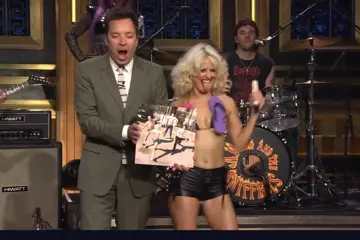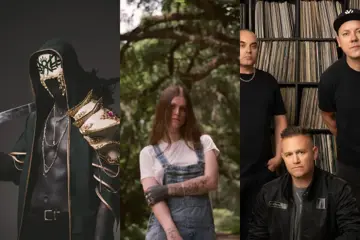Melbourne DJ/producer Lewis CanCut (AKA Lewis Gittus) has taken his "quasi-tropical" dance music – percussive, progressive and party-starting worldbeat – to the 2014 Red Bull Music Academy in Tokyo. It's a long way from his new home in the Dandenong Ranges – or his old in hipster Fitzroy.
Gittus and his artist partner elected to leave urban bohemia for rainforest-surrounded Kallista primarily to be more industrious. "We just wanted the space to have proper studios set up at home where we could really work solidly on our practices during the week and not always be going out for coffee or to the pub," Gittus quips, ironically seated in one of the RBMA's cosy bedroomy studios, after partying late to deep houser Kerri Chandler the night before. The club stalwart, who'd migrated to Melbourne from Castlemaine to attend uni, reckons Fitzroy has become too gentrified. "I found it a little bit funny and annoying that I felt like people who were imitating poor people like me were pricing the poor people like me out of the suburb!"
The move has necessitated lots of late-night driving on weekends, but Gittus sees this as an opportunity to listen to music. The DJ has held residencies across Melbourne (today notably alongside DJ Ransom at Revolver's The Late Show on Saturdays), as well as played festivals as different as Meredith and Future Music. This month he and his Congo Tardis #1 sound system cohort DJ Ms Butt will support Indigenous hip hop polymath Jimblah at Lounge as part of the roots music carnival AWME 2014. Gittus still serves behind the counter at Fitzroy's black music specialist store Northside Records.
Gittus also co-runs Scattermusic with Mat Cant and Scattermish. The concern originated circa 2009 as Scatterblog, but the crew decided to blog less and produce more.
"We don't owe anything to our ancestors in terms of music."
"We started the label as a way for us all to get together and start our careers [but], as everyone involved has developed in their own directions, there's more and more demands on people's time. So all the layers that were Scatterblog – of having the radio and the blog and the label – have slowly been peeled back. Now it's kind of a skeleton machine that just does a release, usually a local artist, about twice a year – something that we really believe in [and] that should be out there. The rest of the time we're all doing our own things." Curiously, Gittus suggests that, since Scatterblog, the "no wave" producer blog phenom has peaked. "It was certainly an era where blogs were exciting – and it was a time when people were using the Internet to really develop new sounds very quickly. They weren't available through record labels conventionally or on CD or in stores. The music we were excited by then was music that was being made and put out online for free. That's all settled down a little bit now. People are investing time again in developing ideas and conceptions in private and then releasing something really worthwhile." Gittus reckons his posse were impatient wannabes. "I think the first things we put out, [the things] that were ours, we listen to them now and they're very embarrassing."
Gittus' debut, 2010's Neon Saxophone EP, surfaced on Scattermusic. In the interim, he's issued music on international labels. Gittus collaborated with Diplo, an early champion of regional genres, local ally Swick and Baltimore rapper TT The Artist on last year's Dat A Freak for Mad Decent – the track was later sampled by Jennifer Lopez' Booty (featuring alternately Pitbull or, on the remix, Iggy Azalea). Currently Gittus is plugging an EP, Fizzy, on Portugal's Enchufada, again with Swick. The title-track is a bit Rustie-mode post-trap rave, a bit Afro-bass, while the B-side, Buff Bumper, is Major Lazer-y dancehall.
Gittus is one of three Australians to win a place as a 2014 RBMA participant. It's allowed him to forge new connections (he's so far recorded with Kenyan Blinky Bill, who creates "African electronic funk") and to "diversify". The academy has an illustrious heritage with Flying Lotus and Perth's Ta-ku among its alumni.
Much to Gittus' amusement, the RBMA press materials classify his style as "tropical trap". (Weirdly, they make no mention of the J Lo coup.) "I was a bit surprised! I would drop the 'trap', just because I find any music genre has a very finite expiry date. I think trap's already been and gone (laughs). But 'tropical' is accurate, I think. One of the things about being a non-Indigenous Australian, who's also not a recent migrant, is we have no culture and we have no history really that we can celebrate. I mean, there's little snippets of things – and then there's stories that have been exaggerated beyond all reason. But we don't owe anything to our ancestors in terms of music. We can choose to do whatever we like – absolutely freely. For me, I just gravitated towards a lot of music from the Caribbean and Brazil and the West Coast of Africa, because it just is so joyous. I grew up with my parents playing folk music – and so all that music, from soca and dancehall, is modern folk music, in that it's a shared culture. So it felt natural."















